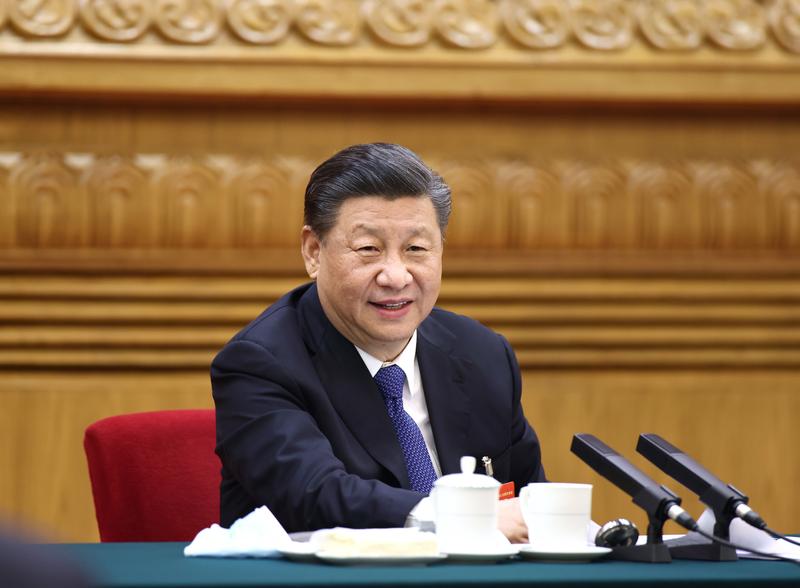 President Xi Jinping, who is also general secretary of the Communist Party of China Central Committee and chairman of the Central Military Commission, takes part in the Inner Mongolia autonomous region delegation's discussion of the Government Work Report during the fourth session of the 13th National People's Congress in Beijing on March 5, 2021. (JU PENG / XINHUA)
President Xi Jinping, who is also general secretary of the Communist Party of China Central Committee and chairman of the Central Military Commission, takes part in the Inner Mongolia autonomous region delegation's discussion of the Government Work Report during the fourth session of the 13th National People's Congress in Beijing on March 5, 2021. (JU PENG / XINHUA)
President Xi Jinping has underlined the need to fully and faithfully understand and implement the new development philosophy featuring innovative, coordinated, green, open and shared growth, and step up the building of the new development paradigm in the new development stage.
Xi also stressed the importance of promoting ethnic unity, and asked the region to earnestly take part in the Party history learning and education campaign
Xi, who is also general secretary of the Communist Party of China Central Committee and chairman of the Central Military Commission, made the remarks on Friday when taking part in discussions with fellow deputies from the delegation of the Inner Mongolia autonomous region at the fourth session of the 13th National People's Congress, the nation's top legislature.
While fully acknowledging the achievements of the autonomous region in the past year, Xi expressed hope that Inner Mongolia could stick to the people-centered development philosophy and coordinate development and security.
ALSO READ: Xi stresses new development philosophy, ethnic unity
He called on the region to identify how it leverages its strength in the nation's efforts to build the new development paradigm by analyzing its advantages and weak links, and further determine the priorities and key industries in its economic development.
Efforts should be made to develop strategic emerging industries and advanced manufacturing, and advance infrastructure construction, Xi said.
He underscored the importance of readjusting the region's economic structure and upgrading the quality of development and highlighted the importance of technological innovation in developing industrial and supply chains.
Xi also urged the region to deepen reforms and opening-up, take steps to improve the business environment, actively take part in joint construction of the Belt and Road, and promote high-quality growth with high-level opening-up.
He praised the region's accomplishments in the elimination of absolute poverty in rural areas, but said there is still a long way to go to address the problems of unbalanced and inadequate development and narrow the development gap between urban and rural areas in order to ultimately realize people's comprehensive development and common prosperity.
Saying that Inner Mongolia's ecological system is fragile and the region faces difficulties and challenges in consolidating the results of poverty alleviation and pushing for rural vitalization, Xi asked the region to develop advantageous industries to increase people's incomes and prevent those who have been lifted out of poverty from becoming poor again.
He stressed the importance of environmental protection in the region and urged it to stick to green development. Concrete efforts should be made to strengthen protection of the ecological system to make it more stable and sustainable, he added.
Five NPC deputies from Inner Mongolia made speeches during the meeting on issues such as developing modern agriculture, high-quality growth in border areas, forest conservation, education and rural vitalization.
During the discussions, Xi also stressed the importance of promoting ethnic unity, and asked the region to earnestly take part in the Party history learning and education campaign.
READ MORE: Xi's book on governance to be published in 17 countries
In January 2018, Xi was unanimously elected by the People's Congress of the Inner Mongolia autonomous region as a deputy to the 13th National People's Congress.
On Friday afternoon, Li Zhanshu, Wang Yang, Wang Huning, Zhao Leji and Han Zheng, who are all members of the Standing Committee of the Political Bureau of the CPC Central Committee, took part in discussions with the delegations of the regions that elected them to the NPC.


